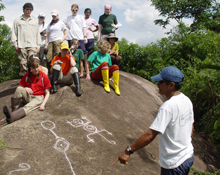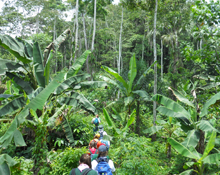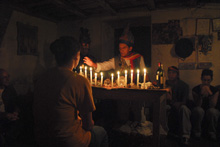People
March 29, 2010
Oxford class goes off the grid on spring break

A lesson on petroglyphs. Photo by Mike McQuaide

A tropical rainforest walk. Photo by Spencer Ramsey

A shaman prepares for a healing ceremony. Photo by Michael Dale
“I want them to deal with the flies. I want them to understand the beginnings of medicine. I want them to experience an authentic Amazonian, shamanistic culture.” In these words Mike McQuaide, professor of sociology at Oxford College, sums up the primary aim of a classroom experience that is one of the most sought-after classes on the Oxford campus.
Students in the course, Social Change in Developing Societies, read primary sources in sociology, psychology and anthropology. These texts and the class discussion they inform serve as preparation for the course laboratory — Rio Blanco, a Quichua village in Ecuador’s Napo province, situated in the upper Amazon basin. Each year, students enrolled in the course spend their spring break in Rio Blanco, observing firsthand what they have read about in the course material.
McQuaide went there first during a sabbatical in 1998; he was looking for a destination where he could experience the total opposite of the everyday plugged-in lifestyle. A travel consultant pointed him to Rio Blanco, and what he experienced made him want to reproduce the effect for students.
He introduced Sociology 231R into the Oxford curriculum in 1999. It has been offered each spring semester since, providing a powerful experience for nearly 200 Oxford students.
The group that traveled to Ecuador during spring break 2010 included 11 students, McQuaide, two other Oxford faculty members and one Emory faculty member. The trip followed the itinerary developed by McQuaide.
The journey to Rio Blanco allows for a gradual approach to the Amazon basin. The group flew from Atlanta to Quito, where they spent a day before heading out by bus.Along the way there was a stop in Otovalo, famous for its large market and for its beautiful weaving. Here the participants also met with local shamans, who performed a ritual healing ceremony, the first of two the group would participate in. From Otovalo, the group continued by bus before switching to boats on the Napo River, where they were eventually deposited at a takeout. The group then hiked three hours through jungle to reach Rio Blanco.
“In Rio Blanco, they’re off the grid,” says McQuaide.“Most of them have never experienced that.” No phones. No Internet. No electricity.
Once in the village, students lived with the Quichua, sleeping on rough-hewn beds as they do, eating as they do and having time to observe and also to interact.
Much of what they experienced in the village was guided by Augustin Grefa, the political and spiritual leader of the community.Elected as head of the community (and called El Presidente by the locals), Grefa is also its shaman or yakchek (the Quichua term), a birthright position for which one trains from an early age.He showed and interpreted local petroglyphs for students, organized walks through the jungle and demonstrated the medicinal and utilitarian plants the Quichua employ.A dramatic highlight of the trip was a second spiritual healing ceremony, led by Grefa just prior to the group’s departure.
When they return, students are eager to speak of the experience. Freshman Uma Chidambaram calls the recent trip “incredibly enriching.” When asked what she would most like to say about it, she replies, “When experiencing life in a developing society, it is of the utmost importance to surrender the illusion of control.” Knowing when to yield control is something not easily taught, and the rhythm of life in Rio Blanco provides students a laboratory in which to learn.
Quick Links
File Options
Related Information
Other reports from spring break
The Alternative Spring Break club recently released a video of their community service project in New Orleans.
